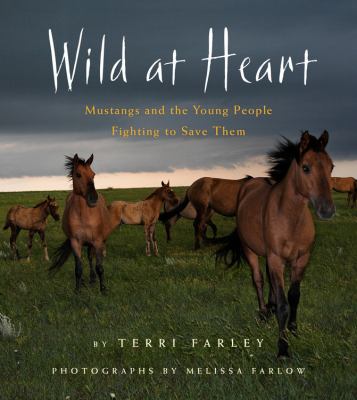
by Terri Farley
School Library Journal Gr 5-8-Wearing her heartfelt agenda on both sleeves, Farley focuses on the plight of feral horses in this country, which are, in her view, being brutally rounded up by the thousands and either relocated or auctioned to "kill buyers" for animal food. Along with statistics (which, she claims, are hard to pin down due to government "secrecy and disorganization"), she presents comments from researchers, uncomfortably explicit eyewitness reports from observers, and even a set of tweets that she sent during an auction as evidence of ongoing cruel treatment and poor management. In appeals to the emotions that are underscored by Farlow's lyrical photos of mustangs running free or posing in graceful stances, Farley also describes the social behavior of wild horses, their history on this continent (cogently arguing that they are still "native species" despite having died out and later reintroduced by European settlers), and the achievements of rescue workers from early champion Velma Johnston to nine young current activists. VERDICT An urgent call to action, supported with detailed endnotes and a substantial bibliography.-John Peters, Children's Literature Consultant, New York City © Copyright 2015. Library Journals LLC, a wholly owned subsidiary of Media Source, Inc. No redistribution permitted. (c) Copyright Library Journals LLC, a wholly owned subsidiary of Media Source, Inc. No redistribution permitted. Book list Wild horses were officially declared symbols of the American West in 1971, but it was a long road to get them there, and the effort to protect them is far from over. From the campaign of animal-rights activist Velma Johnston (known as Wild Horse Annie), beginning in the 1950s, to the efforts of teenagers today, a small but determined group has fought to preserve wild mustangs and to combat the unethical treatment they still face. This volume reaches back into the evolutionary history of the horse before turning a sharp eye to the herd dynamics of wild herds today and the danger mustangs are in due to rough roundups that end with many being sent to slaughterhouses. Interspersed throughout the text are various eyewitness accounts that detail the actions of activists, photographers, and advocates, both on the range and at auctions. The finished book boasts a crisp, square layout with exceptionally eye-catching photography, and a final chapter on children and teens involved in the fight to save wild horses is particularly evocative and will surely usher in a new generation of activists.--Reagan, Maggie Copyright 2015 Booklist From Booklist, Copyright © American Library Association. Used with permission. |